Choosing the right flute brand can be a transformative decision in your musical journey. Brands like Yamaha offer durability and precision, making them great for beginners and pros alike. If you're looking for warmth, consider a wood flute from Pearl or a well-crafted Gemeinhardt. For intermediate players, Azumi provides solid silver options that enhance sound projection. Think about your personal style, budget, and how comfortable you feel with each instrument. Remember, the right flute aligns with your musical goals and preferences. Stay tuned, and you'll uncover more insights to guide your choice effectively.
Understanding Flute Types
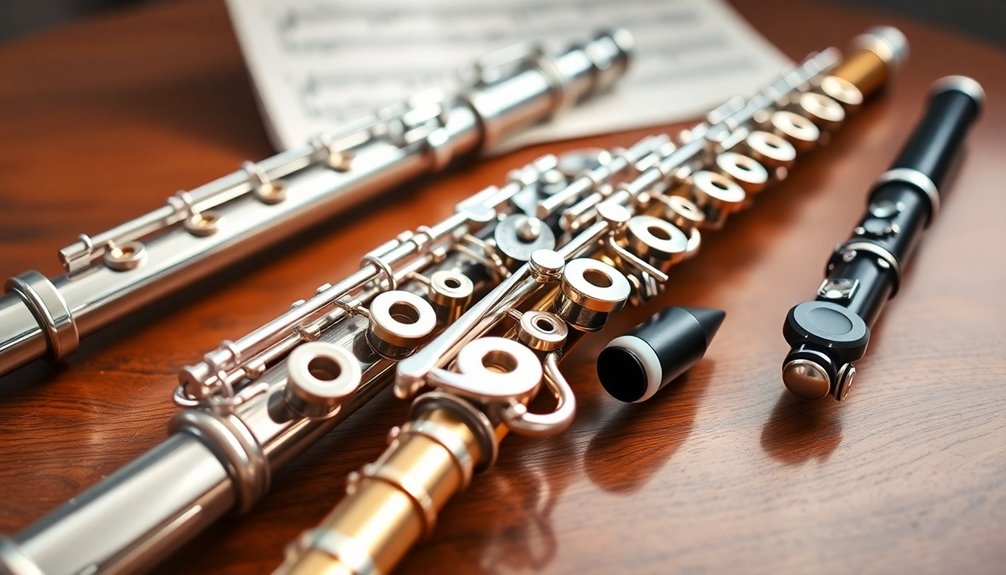
When it comes to choosing a flute, understanding the different types available can make all the difference in your playing experience. You'll encounter flutes made from various materials, each offering unique tonal qualities and weight. For instance, silver flutes provide a bright, resonant sound, while those made from nickel can be more affordable yet still deliver a satisfying tone.
Wood flutes, on the other hand, are cherished for their warmth and rich timbre, perfect for certain styles of music. Knowing the materials helps you determine which flute aligns with your musical aspirations. Additionally, higher-quality woods such as rosewood and maple contribute to an instrument's overall sound resonance and durability.
But it's not just about the type; flute maintenance tips are equally important for preserving your investment. Regular cleaning, proper storage, and handling techniques can greatly extend the life of your instrument. For example, swabbing out moisture after each session prevents damage and keeps your flute in ideal playing condition.
As you explore the world of flutes, consider how each type resonates with your personal style and goals. Engaging with fellow musicians or joining a community can enhance your understanding and help you make a more informed choice.
Remember, it's not just about selecting an instrument; it's about finding one that feels like an extension of yourself. By grasping the nuances of different flute materials and committing to maintenance, you're setting yourself up for a rewarding musical journey.
Key Features to Consider

Choosing the right flute involves considering several key features that can greatly impact your playing experience. From the materials used to the design, each aspect plays a vital role in how you connect with your instrument. Understanding these features can help you find a flute that feels like an extension of yourself.
- Key Materials: The materials your flute is made from can influence its sound quality and durability. Common options include silver, gold, and various alloys, each offering a unique tonal character.
- Ergonomic Design: A flute that fits comfortably in your hands allows for better control and longer practice sessions. Look for features like offset G keys or adjustable foot joints that cater to your playing style.
- Scale and Tone Quality: Consider how the flute's design affects its scale and overall tone. A well-balanced instrument can enhance your ability to play with precision and warmth.
- Maintenance Requirements: Different materials and designs come with varying maintenance needs. Choose a flute that fits your lifestyle, ensuring you can keep it in peak condition without too much hassle. Additionally, regular maintenance can extend the lifespan of your instrument significantly, making it a worthwhile investment for serious musicians.
Popular Flute Brands Overview
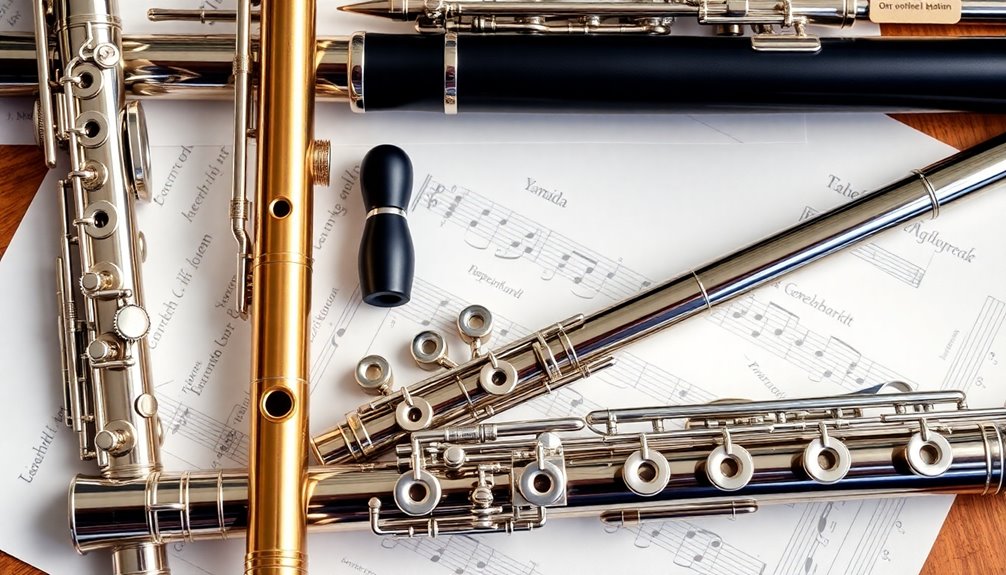
With a solid understanding of the key features that influence your flute playing, it's time to explore the brands that stand out in the market. Each brand has a unique history and craftsmanship techniques that contribute to its distinct sound and feel. Here's a snapshot of some popular flute brands you might consider:
| Brand | Highlights |
|---|---|
| Yamaha | Known for its precision and durability, Yamaha flutes feature innovative craftsmanship techniques. |
| Pearl | Renowned for their hand-finished flutes, Pearl combines tradition with modern technology. |
| Gemeinhardt | With a rich brand history, Gemeinhardt focuses on student-friendly designs that don't compromise quality. |
| Muramatsu | Offers exquisite craftsmanship, aimed at professional players who seek the finest materials and sound. |
| Trevor James | Blends affordability with quality, making it a favorite among aspiring musicians. |
When choosing a flute, consider how the brand's history and craftsmanship techniques align with your personal style and playing goals. Yamaha, for instance, has established a reputation for producing reliable instruments that suit beginners and advanced players alike. In contrast, brands like Muramatsu cater to those who desire unparalleled quality and artistry in their instruments. Additionally, understanding the brand reputation can significantly impact your decision-making process.
Ultimately, understanding these brands helps you find a flute that feels like an extension of your musical expression. As you explore your options, remember that the right instrument can enhance your journey as a flutist, fostering a deeper connection to the music you love.
Beginner-Friendly Options
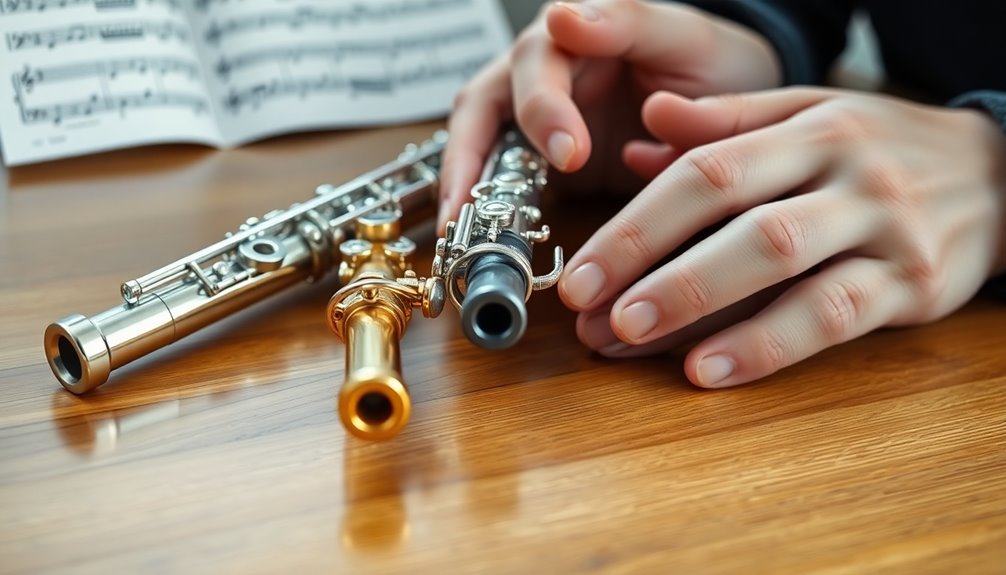
As you begin your flute-playing journey, it's important to find an instrument that suits your needs as a beginner. The best beginner flutes are designed to be user-friendly, helping you develop your skills without overwhelming you.
When selecting a flute, consider factors like price, brand reputation, and ease of play. Here are some beginner-friendly options to explore:
- Yamaha YFL-221: Known for its durability and excellent sound quality, this flute is perfect for new players.
- Gemeinhardt 2SP: This model offers a solid build and smooth keys, making it a popular choice for beginners.
- Azumi AZ2: With its silver-plated body and professional features, the Azumi provides a great balance of quality and affordability.
- Trevor James 10X: This flute is lightweight and easy to handle, ideal for those just starting out.
In addition to choosing the right flute, keeping it in good condition is vital. Investing in a quality instrument ensures a better experience and promotes faster progress.
Here are a few flute maintenance tips to make sure your instrument stays in top shape:
- Clean the flute after each use to prevent moisture buildup.
- Avoid exposing your flute to extreme temperatures or humidity.
- Regularly check for any loose screws or pads that may need adjustment.
- Consider taking your flute to a professional for an annual maintenance check.
Intermediate Player Recommendations
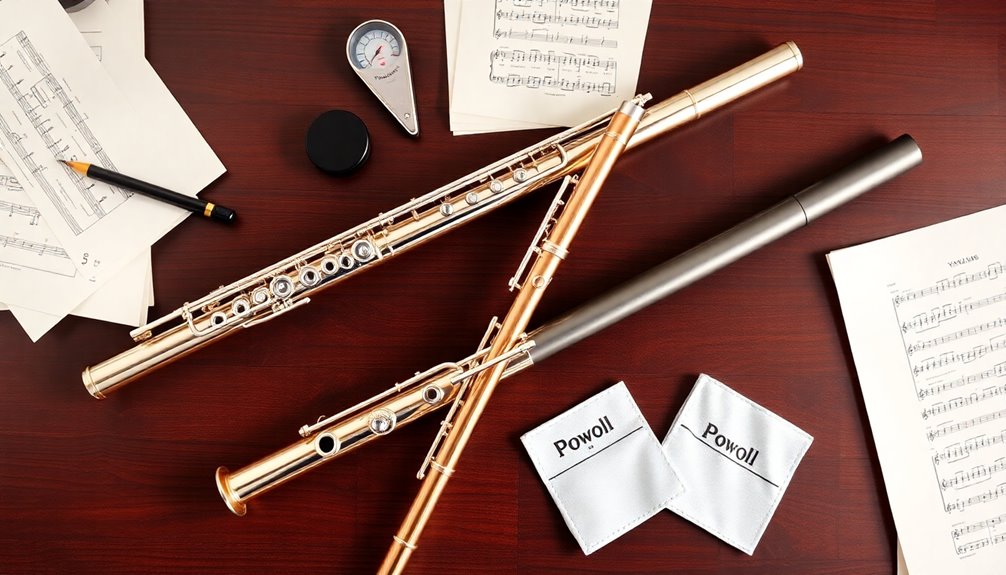
Once you've gained some experience with your flute, it's time to explore instruments that cater to your developing skills. As an intermediate player, you're likely ready to enhance your playing with flutes that support more advanced techniques and offer better sound projection.
When considering your options, brands like Yamaha, Azumi, and Gemeinhardt stand out. Yamaha flutes are known for their consistent quality and reliable sound. Their models often come with features like the offset G key and a C# trill key, which are perfect for refining your intermediate techniques.
Azumi flutes, with their solid silver bodies, add warmth to your tone, enabling you to project your sound beautifully in various settings. Gemeinhardt is another brand that's worth a look. Their flutes are designed for players who are ready to explore richer tones and more complex music.
Many of their intermediate models have a low B key, allowing for greater versatility in your repertoire. As you evaluate these options, think about what you want to achieve as a musician. Do you want to focus on classical pieces, or are you interested in jazz and contemporary music?
The right flute won't only enhance your sound projection but also inspire your playing journey. Remember, investing in an intermediate flute is a significant step toward expressing your artistry and connecting with fellow musicians. Additionally, consider the materials like cupronickel that can enhance tonal quality and durability in your chosen instrument. Choose wisely, and enjoy the growth that comes with your new instrument!
Advanced Flute Selections
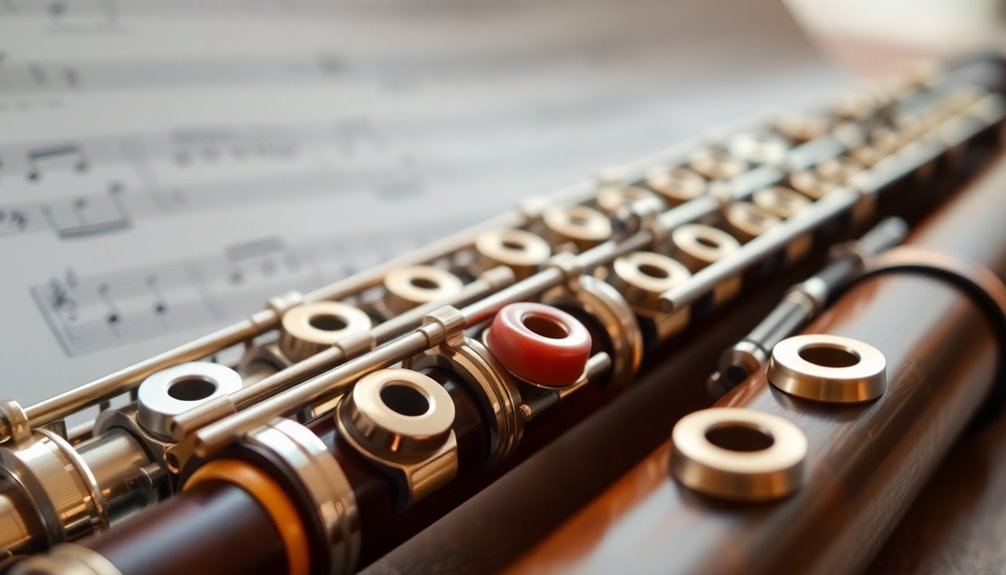
Choosing the right advanced flute can greatly elevate your playing experience and refine your musical expression. As you reach this stage in your journey, you'll want to explore professional models that enhance your technique and sound. These flutes are engineered for precision, allowing you to achieve a level of artistry that resonates deeply with audiences.
When considering an advanced flute, keep in mind the following key aspects:
- Material: Look for flutes crafted from high-quality silver or gold, which can add warmth and richness to your tone.
- Custom options: Many manufacturers offer customizable features, such as key configurations and body styles, to suit your playing preferences.
- Mechanics: Advanced flutes often include French or open-hole key mechanisms, providing greater flexibility and control.
- Brand reputation: Research brands recognized for their craftsmanship and the community of players who swear by them.
Investing in an advanced flute isn't just about the instrument itself; it's about finding a voice that truly reflects your musical identity. By choosing a professional model tailored to your needs, you'll not only improve your skillset but also connect with a community that values artistry and expression. Additionally, exploring premium intermediate flutes can be a great way to bridge the gap between student and professional models, ensuring you find the perfect fit for your evolving style.
Comparing Sound Quality
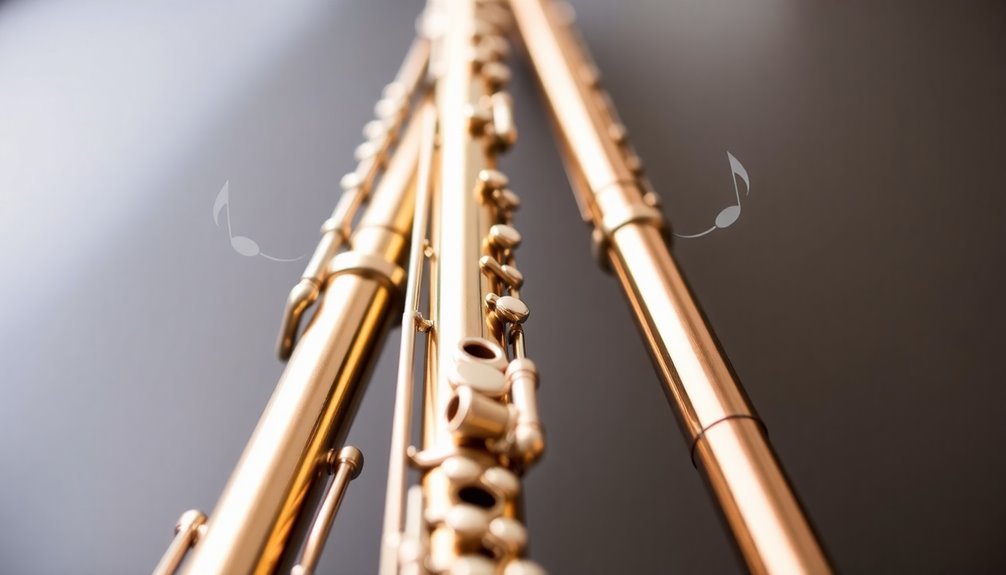
When it comes to comparing sound quality among flute brands, you'll want to dive deep into the tonal characteristics that each model offers. The essence of a great flute lies in its ability to deliver exceptional sound projection and tonal clarity, which can notably enhance your playing experience.
As you experiment with different brands, pay attention to how the flute responds to your breath and finger movements. Some flutes are designed to project sound more efficiently, making them ideal for larger performance spaces. If you find yourself playing in ensembles or orchestras, a flute with strong sound projection can help your voice stand out while blending harmoniously with others.
Tonal clarity is equally essential. A flute that produces a clear, focused sound allows you to express your musical ideas more effectively. You'll want to choose a brand that highlights the nuances in your playing, whether you're performing delicate passages or bold melodies.
Consider the materials and craftsmanship of each flute, as they play a key role in determining sound quality. For instance, silver or gold flutes often produce a warmer, richer tone compared to their student-model counterparts. Additionally, investing in high-grade stainless steel flutes can enhance metallic taste integrity, ensuring your musical expression remains untainted.
Ultimately, finding the right flute for you is about discovering a sound that resonates with your style and aspirations. By focusing on sound projection and tonal clarity, you can confidently select a brand that feels like a true extension of your musical identity.
Price Ranges and Budgeting
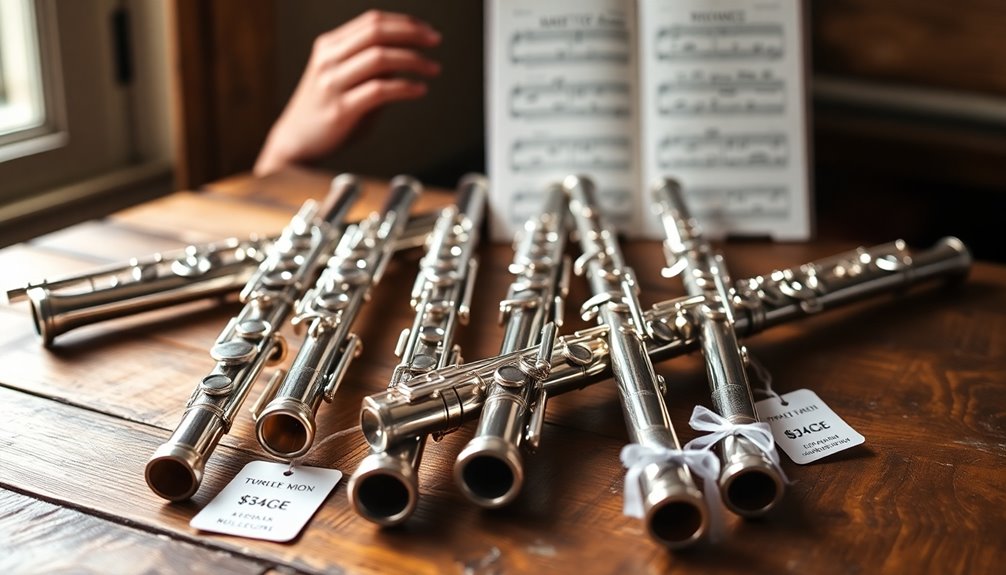
While sound quality is a top priority for many flute players, understanding price ranges and budgeting is equally important in making the right choice. Traversing the world of flutes can feel overwhelming, especially when you're faced with various brands and price points.
It's crucial to establish a budget that aligns with your personal needs and musical aspirations.
Here are some budgeting strategies to reflect on:
- Set a realistic budget based on your experience level and how often you plan to play.
- Research price comparisons across different brands to find the best value for your money.
- Consider used or refurbished flutes as a way to save without sacrificing quality.
- Factor in additional costs, such as maintenance, accessories, and upgrades, when evaluating your overall budget.
When you're clear about your budget, you'll find it easier to filter through options and focus on flutes that suit your financial plan.
Remember that while it might be tempting to go for the cheapest option, investing a bit more can lead to better sound quality and durability. Additionally, many affordable flutes offer excellent features that can enhance your playing experience without breaking the bank.
Stay informed about the brands you're interested in, and don't hesitate to reach out to other players for insights.
Ultimately, a well-planned budget won't only help you find the right flute but also make your journey as a musician more fulfilling.
Embrace the process, and you'll discover a flute that resonates with both your musical goals and your wallet.
Customer Reviews and Feedback
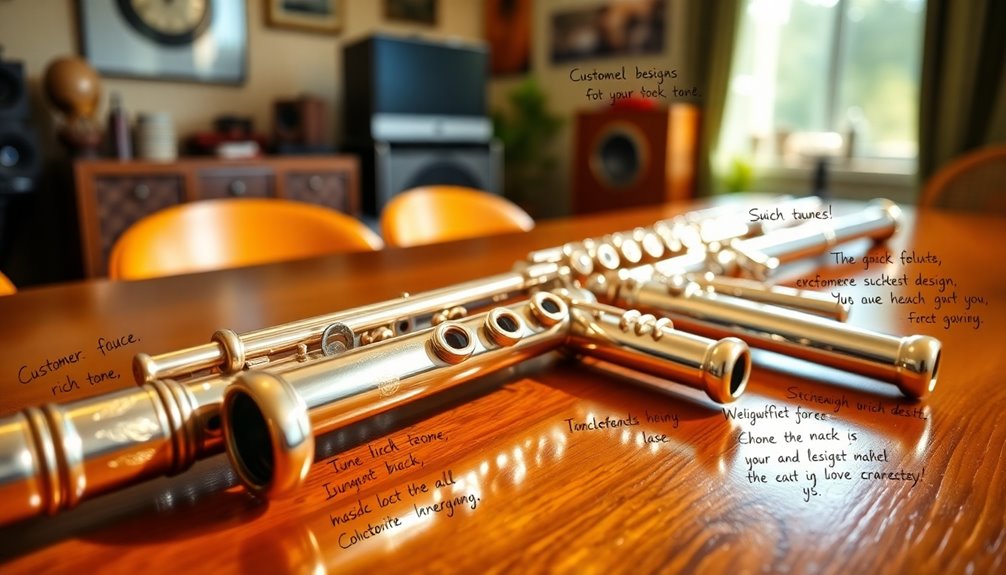
Customer reviews and feedback serve as invaluable resources for making informed decisions about flute purchases. When you're diving into the world of flutes, tapping into user experiences can provide insights that you mightn't find in product descriptions or brand marketing.
You'll want to look for patterns in customer satisfaction; after all, a flute that resonates well with others is likely to meet your needs too. Many players share their thoughts on aspects like sound quality, ease of play, and durability.
Take the time to read through both positive and negative reviews, as they can highlight features you may appreciate or drawbacks you'll want to avoid. For example, some users rave about the rich tones of a particular brand, while others might express concerns about the weight or responsiveness of the keys.
Look for reviews that mention the customer service experience as well. A brand that stands behind its products often translates to higher customer satisfaction. If users report swift resolutions to issues or helpful guidance, that's a significant plus. Additionally, many reviewers highlight the warranty coverage that provides assurance against manufacturing defects as a key factor in their purchasing decision.
Making Your Final Decision
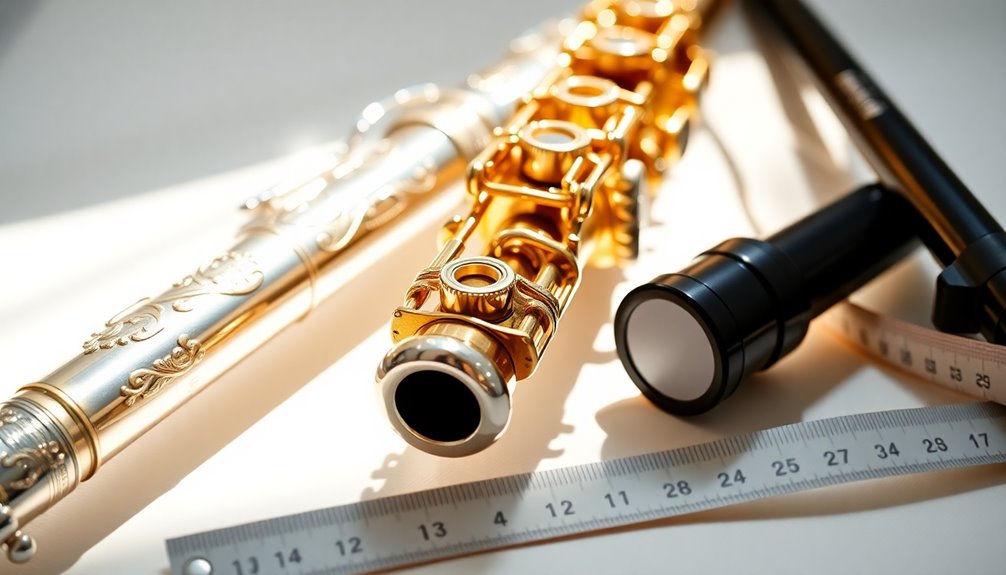
Deciding on the right flute can feel overwhelming, especially with so many options available. You've likely researched different brands, read reviews, and perhaps even tried a few instruments.
Now, it's time to distill all that information into a decision that aligns with your personal preferences and musical goals.
Consider these key decision factors before you finalize your choice:
- Sound Quality: Listen closely to how each flute resonates. The tone should inspire you and match your style.
- Playability: Verify the flute feels comfortable in your hands. The weight and key placement can greatly affect your experience.
- Budget: Determine how much you're willing to spend. A higher price doesn't always guarantee better quality; find what suits you best.
- Brand Reputation: Some brands are known for their craftsmanship and customer support. Researching these can give you confidence in your choice.
Ultimately, the right flute is the one that feels like an extension of yourself. It should motivate you to play and express your creativity. The Cecilio Closed Hole C Flute, for instance, is a recommended choice for beginners due to its elegant design and user-friendly features.
Take your time to weigh these factors against your personal preferences. Don't rush; this instrument will accompany you on your musical journey.
Frequently Asked Questions
How Do I Maintain My Flute for Longevity?
To maintain your flute for longevity, you've got to follow some essential flute cleaning tips.
Always swab your flute after playing to remove moisture and keep the pads dry.
For storage, choose a sturdy case that protects it from dust and impacts.
Avoid leaving it in extreme temperatures.
Regularly check for any issues, and consider a professional maintenance once a year.
Can I Customize My Flute With Different Accessories?
Absolutely, you can customize your flute with various flute accessories! From different mouthpieces to unique key options, there are plenty of customization options available.
You might even consider adding a beautiful case or special pads that enhance your playing experience. Each accessory can reflect your personal style, making your flute truly yours.
Embracing these choices not only improves functionality but also fosters a sense of belonging within the musical community.
What Are Common Repair Issues for Flutes?
When it comes to common repair issues for flutes, you'll often encounter pad replacement and key alignment problems.
Pads can wear out over time, affecting your sound quality, while misaligned keys can disrupt your playing experience.
Regular maintenance helps prevent these issues, so keep an eye on your instrument.
If you notice any difficulty while playing, it's best to consult a professional to guarantee your flute remains in top shape.
How Often Should I Get My Flute Serviced?
You should aim for regular flute servicing every 6 to 12 months, depending on how often you play.
Professional recommendations suggest that frequent players benefit from annual check-ups to catch minor issues before they escalate.
If you're just starting or play occasionally, a service every couple of years might suffice.
Staying proactive not only prolongs your flute's life but also guarantees it sounds its best, helping you feel confident in your musical journey.
Are There Specific Brands Preferred by Professional Flutists?
Picture yourself on stage, the spotlight shining as you play an exquisite melody.
Many professional flutists prefer brands like Yamaha and Pearl for their reliability and rich tone. Yamaha's precision and smooth action make it a favorite, while Pearl's craftsmanship offers a warm, lyrical sound.
Gemeinhardt features, like their ergonomic design, also attract those seeking comfort and ease.
Choosing the right brand can elevate your performance and create a connection with your music.
Conclusion
In choosing the right flute, remember that nearly 70% of musicians report improved skills with an instrument they feel connected to. Whether you're just starting or looking to upgrade, focus on your personal preferences and goals. From beginner-friendly options to professional brands, understanding the nuances of each will help you make an informed choice. Trust your instincts, consider your budget, and don't hesitate to test a few flutes. The right one is out there, waiting for you!






